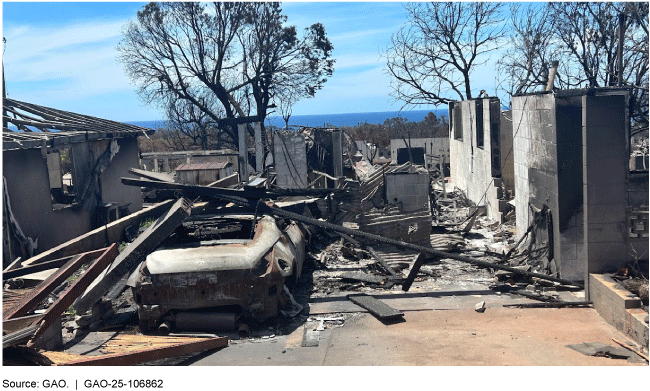Wildfires: Additional Actions Needed to Address FEMA Assistance Challenges
Fast Facts
Wildfires have increased in size and severity in recent decades. There are also more new homes and other buildings in fire-prone areas.
The Federal Emergency Management Agency provided over $3.8 billion in wildfire-related assistance in FY 2019-2023. That paid for work such as debris removal and utility repairs.
We interviewed officials from 22 state, local, and tribal governments about their experiences with FEMA assistance. They cited challenges such as:
Delayed help with post-fire erosion control work that could reduce future damages
Confusing rules and complex paperwork
Our 6 recommendations address these issues and more.
Debris from the August 2023 wildfire in Lahaina, Hawaii

Highlights
What GAO Found
The Federal Emergency Management Agency (FEMA), within the Department of Homeland Security (DHS), provided over $3.8 billion in wildfire-related assistance from fiscal years 2019 through 2023. The agency obligated about $3.2 billion in Public Assistance grants for emergency work (such as debris removal and emergency protective measures), and permanent recovery work (repairing or replacing roads, utilities, and buildings).
Example of How Wildfires Can Affect Landscapes

GAO interviewed officials from 22 state, local, and tribal governments about their experiences obtaining FEMA assistance for wildfires. Examples of challenges officials cited included:
- Post-wildfire Mitigation. Wildfires destroy vegetation and damage soil, creating conditions that can increase immediate risks of flooding, erosion, and debris flows—fast-moving, destructive landslides that often strike without warning. GAO found that communities continue to face challenges addressing post-wildfire risks, in part because FEMA's assistance programs are too slow to support more timely post-wildfire mitigation. Taking steps to provide immediate post-wildfire mitigation assistance could help foster more resilient communities and reduce future demand on federal resources.
- Fire Management and Assistance Grants (FMAG) management. State, local, and tribal officials GAO interviewed said they faced challenges associated with the FMAG program, including the quantity and complexity of required paperwork, and confusion over eligibility requirements. However, FEMA does not collect ongoing, nationwide feedback from state, local, and tribal FMAG recipients, as it does for other grant programs. Collecting, assessing, and incorporating such feedback into program policy, as appropriate, would help FEMA address challenges.
Why GAO Did This Study
In recent decades, much of the nation has witnessed an increase in the size and severity of wildfires. At the same time, development in and around wildland areas has increased. Demand for federal resources to mitigate against, respond to, and recover from these wildfires has increased.
The FEMA Improvement, Reform, and Efficiency Act of 2022 includes a provision for GAO to examine FEMA wildfire assistance programs. This report examines (1) FEMA assistance to wildfire-affected communities from fiscal years 2019 through 2023, and (2) challenges communities face with this assistance and to what extent FEMA has taken steps to address them.
GAO analyzed data from FEMA assistance programs from fiscal years 2019 through 2023 and reviewed agency policies, guidance, and assessments of FEMA's wildfire assistance. GAO interviewed officials from FEMA and a non-generalizable sample of seven state, 11 local, and four tribal governments that obtained FEMA assistance for wildfires during this period. GAO conducted site visits to Hawaii, Washington, and the Nez Perce Tribe.
Recommendations
GAO is making six recommendations, including for FEMA to provide immediate post-wildfire mitigation assistance and to establish a process to collect, assess, and incorporate ongoing feedback from FMAG recipients. DHS concurred with five recommendations and did not concur with one recommendation. GAO continues to believe all six recommendations are warranted.
Recommendations for Executive Action
| Agency Affected | Recommendation | Status |
|---|---|---|
| Federal Emergency Management Agency | The FEMA Administrator should assess ways to provide assistance for immediate post-wildfire mitigation and take steps to provide such assistance. If FEMA determines it needs additional authorities, it should develop a legislative proposal for implementing the proposed change(s). (Recommendation 1) |
When we confirm what actions the agency has taken in response to this recommendation, we will provide updated information.
|
| Department of Homeland Security | The Secretary of Homeland Security should follow the process to expand, establish, or adopt a categorical exclusion for wildfire mitigation activities that includes post-wildfire soil stabilization and erosion control measures. (Recommendation 2) |
When we confirm what actions the agency has taken in response to this recommendation, we will provide updated information.
|
| Federal Emergency Management Agency | The FEMA Administrator should establish a formal process to regularly collect and assess nationwide feedback from state, local, and tribal FMAG recipients and incorporate such feedback into program policy, as appropriate. (Recommendation 3) |
When we confirm what actions the agency has taken in response to this recommendation, we will provide updated information.
|
| Federal Emergency Management Agency | The FEMA Administrator should document its position on approving FMAG declarations for fires burning on federal land but threatening nearby communities in the FMAG Program and Policy Guide. (Recommendation 4) |
When we confirm what actions the agency has taken in response to this recommendation, we will provide updated information.
|
| Federal Emergency Management Agency | The FEMA Administrator should clarify eligible pre-positioning costs, including use of in-state resources, in the FMAG Program and Policy Guide. (Recommendation 5) |
When we confirm what actions the agency has taken in response to this recommendation, we will provide updated information.
|
| Federal Emergency Management Agency | The FEMA Administrator should amend the FMAG regulations to provide tribal governments the option to request FMAG declarations directly from FEMA. (Recommendation 6) |
When we confirm what actions the agency has taken in response to this recommendation, we will provide updated information.
|
